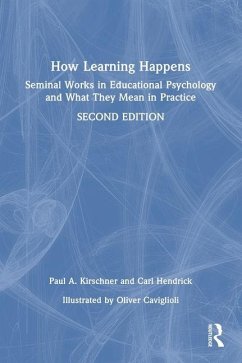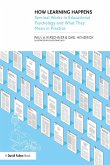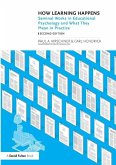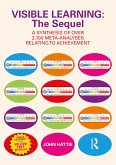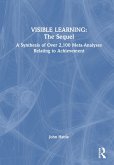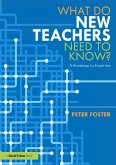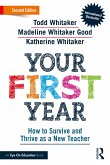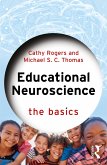How Learning Happens introduces 32 giants of educational research and their findings on how we learn and what we need to know to learn effectively, efficiently, and enjoyably. Many of these works have inspired researchers and teachers all around the world and have left a mark on how we teach today.
Now updated to include a new section on Memory and Cognition with five new chapters, this revised second edition explores a selection of the key works on learning and teaching, chosen from the fields of educational psychology and cognitive psychology. It offers a roadmap of the most important discoveries in the way learning happens, with each chapter examining a different work and explaining its significance before describing the research, its implications for practice, and how it can be used in the classroom - including the key takeaways for teachers.
Clearly divided into seven sections, the book covers:
Memory and cognitionHow the brain worksPrerequisites for learningHow learning can be supportedTeacher activitiesLearning in contextCautionary tales
Written by two leading experts and illustrated by Oliver Caviglioli, this is essential reading for teachers wanting to fully engage with and understand educational research as well as undergraduate students in the fields of education, educational psychology, and the learning sciences.
Now updated to include a new section on Memory and Cognition with five new chapters, this revised second edition explores a selection of the key works on learning and teaching, chosen from the fields of educational psychology and cognitive psychology. It offers a roadmap of the most important discoveries in the way learning happens, with each chapter examining a different work and explaining its significance before describing the research, its implications for practice, and how it can be used in the classroom - including the key takeaways for teachers.
Clearly divided into seven sections, the book covers:
Memory and cognitionHow the brain worksPrerequisites for learningHow learning can be supportedTeacher activitiesLearning in contextCautionary tales
Written by two leading experts and illustrated by Oliver Caviglioli, this is essential reading for teachers wanting to fully engage with and understand educational research as well as undergraduate students in the fields of education, educational psychology, and the learning sciences.
Praise for the first edition:
"It is BRILLIANT! How Learning Happens should be recommended reading for every PGCE/SCITT/teacher."
- Dan West, @DanWestPhD
"Just the best book ever about the research that applies to what we do in the classroom."
- Helen Reynolds, @helenrey
"Quite possibly the best pedagogical book I've ever read. 28 educational giants all in one place with practical strategies and fab illustrations."
- LyndseyMA5, @MorganLyndseyma
"For a lot of different reasons I personally believe that this is one of the most important books for teachers to read."
- James Dixon, @MrDixonMath
"I was recently asked what books I'd recommend to a brand-new teacher. I didn't hesitate in saying How Learning Happens and How Teaching Happens. Not only are they astonishingly beautiful, but they give time-poor teachers digestible research that can positively impact teaching."
- EMC, @EMCTeach
"What a gem! I can't put this book down! I want to buy it for my whole staff."
- Enrique Rodriguez, @erod04
"Dr. Kirschner and Dr. Hendrick curated a collection of key works about the underlying processes of learning. Not only did the authors carefully select and summarize the research, they connect the dots making the science accessible, relevant and actionable for the classroom. It's the what, the why and the how packaged together in an easily digestible read - something that is largely otherwise missing in education. As a teacher, I've leveraged the concepts from How Learning Happens to maximize the time and quality of my instruction. As a doctoral student, this text has served as an exemplar of how research can be made practical and applicable for educators."
- Sarah Oberle, @S_Oberle
"So often I've been asked to recommend a starting text for educators interested in the workings of the mind-now I have one. The text Kirschner and Hendrick offer alongside each seminal article does a wonderful job of situating the content in the broader scientific context, and in the classroom."
- Daniel Willingham, Professor of Psychology and Director of Graduate Studies, University of Virginia
"As the volume of research into psychology and education grows, it becomes ever harder for researchers, let alone teachers, to keep up with the latest findings. Moreover, striking results often turn out to be difficult, or impossible to replicate. What teachers need, therefore, is good guidance about research that has stood the test of time, and practical guidance about how these well-established findings might be used to inform teaching practice, and this is why this is such an extraordinary, wonderful and important book. Paul Kirschner and Carl Hendrick have selected the most important research publications in the psychology of education, and, for each publication, they have provided a summary of the research, the main conclusions, and a series of practical suggestions for how the findings might inform teaching practice. I know of no other book that provides such a rigorous, accessible and practical summary of the last fifty years of research in educational psychology, and anyone who wants to understand how research can improve teaching needs to read this book. Highly recommended."
- Dylan Wiliam, Emeritus Professor of Educational Assessment, University College London
"It's hard to overstate just how fabulous this book is; a book I've wanted to exist for years and now here it is. A judicious and comprehensive selection of seminal research papers presented by two expert communicators, this is absolutely superb - from the mouth-watering list of contents, and through each of the chapters. I meet teachers in schools every week who, on hearing about various findings from research, feel liberated, enlightened with a whole new perspective on the problems they wrestle with in their classrooms. Teachers are busy - often overwhelmed - and all too frequently have not yet found the time or had the opportunity to engage with research that underpins the profession they've committed their lives to. This book is going to change that for a lot of people. The format is excellent, presenting the original papers alongside insightful commentary and key practical recommendations; a brilliant idea executed with style! Every school should have this book and every teacher should read it."
- Tom Sherrington, education consultant; author of The Learning Rainforest and Rosenshine's Principles in Action
"With the increasing volume of calls for education to become more evidence based, teachers everywhere have shaken their heads and wondered where on earth they're supposed to find the time to locate, read and evaluate the ever-increasing acreage of research papers out there. Worry no more. In How Learning Happens: Seminal Works in Educational Psychology and What They Mean in Practice, Kirschner and Hendrick have done the hard work so that you don't have to. The volume you have in your hands has compiled some of the most important and prominent research papers in the field of education and distilled them into a form that is genuinely useful to anyone chipping away at the chalk face. But, not only is this a resource of unparalleled utility, it's also a fascinating and world-enlarging read."
- David Didau, author of Making Kids Cleverer
"Future historians of education will look back on this period as a Renaissance; a time when dogma and orthodoxy were being challenged, and gate keepers, priesthoods and shamans felt the ground shift beneath their feet. The sleep of reason has bred monsters of pedagogy, and they have been fattened and nurtured by the relative ignorance of the teaching profession. Not a general ignorance, but a specific one: ignorance of the evidence bases behind the claims made in education. This Renaissance has been accompanied by an evolution, as teachers and academics reach out to one another and seek sincere, authentic dialogue. But, unless we stand on the shoulders of giants who have gone before us, each generation is doomed to rediscover what their ancestors painstakingly uncovered. For the health of the profession, we need the best of what we know in one place, so that successive generations of educators can carry on from their ancestors, and carry the conversation into the future rather than tread water endlessly.
This book is the perfect resource with which to do so. I can give no higher accolade than to say that every teacher should be familiar with the research it represents, its chapters should be required reading on every teacher induction course, and no teacher should account themselves a professional until they can demonstrate its acquaintance. I wish I had read it in the infancy of my career."
- Tom Bennett, Founder, researchED
"In these increasingly evidence-informed days, we are encouraged to be familiar with the research literature and reflect on the finding from within our own frames of reference. This book provides an interesting glimpse into some of the studies that have been influential in the thinking of the authors.
For the research geek, it is a thought-provoking read. It will be adored by many and I hope it introduces some to the complexity of psychology and the study of cognition."
- Megan Dixon, TES
"It is BRILLIANT! How Learning Happens should be recommended reading for every PGCE/SCITT/teacher."
- Dan West, @DanWestPhD
"Just the best book ever about the research that applies to what we do in the classroom."
- Helen Reynolds, @helenrey
"Quite possibly the best pedagogical book I've ever read. 28 educational giants all in one place with practical strategies and fab illustrations."
- LyndseyMA5, @MorganLyndseyma
"For a lot of different reasons I personally believe that this is one of the most important books for teachers to read."
- James Dixon, @MrDixonMath
"I was recently asked what books I'd recommend to a brand-new teacher. I didn't hesitate in saying How Learning Happens and How Teaching Happens. Not only are they astonishingly beautiful, but they give time-poor teachers digestible research that can positively impact teaching."
- EMC, @EMCTeach
"What a gem! I can't put this book down! I want to buy it for my whole staff."
- Enrique Rodriguez, @erod04
"Dr. Kirschner and Dr. Hendrick curated a collection of key works about the underlying processes of learning. Not only did the authors carefully select and summarize the research, they connect the dots making the science accessible, relevant and actionable for the classroom. It's the what, the why and the how packaged together in an easily digestible read - something that is largely otherwise missing in education. As a teacher, I've leveraged the concepts from How Learning Happens to maximize the time and quality of my instruction. As a doctoral student, this text has served as an exemplar of how research can be made practical and applicable for educators."
- Sarah Oberle, @S_Oberle
"So often I've been asked to recommend a starting text for educators interested in the workings of the mind-now I have one. The text Kirschner and Hendrick offer alongside each seminal article does a wonderful job of situating the content in the broader scientific context, and in the classroom."
- Daniel Willingham, Professor of Psychology and Director of Graduate Studies, University of Virginia
"As the volume of research into psychology and education grows, it becomes ever harder for researchers, let alone teachers, to keep up with the latest findings. Moreover, striking results often turn out to be difficult, or impossible to replicate. What teachers need, therefore, is good guidance about research that has stood the test of time, and practical guidance about how these well-established findings might be used to inform teaching practice, and this is why this is such an extraordinary, wonderful and important book. Paul Kirschner and Carl Hendrick have selected the most important research publications in the psychology of education, and, for each publication, they have provided a summary of the research, the main conclusions, and a series of practical suggestions for how the findings might inform teaching practice. I know of no other book that provides such a rigorous, accessible and practical summary of the last fifty years of research in educational psychology, and anyone who wants to understand how research can improve teaching needs to read this book. Highly recommended."
- Dylan Wiliam, Emeritus Professor of Educational Assessment, University College London
"It's hard to overstate just how fabulous this book is; a book I've wanted to exist for years and now here it is. A judicious and comprehensive selection of seminal research papers presented by two expert communicators, this is absolutely superb - from the mouth-watering list of contents, and through each of the chapters. I meet teachers in schools every week who, on hearing about various findings from research, feel liberated, enlightened with a whole new perspective on the problems they wrestle with in their classrooms. Teachers are busy - often overwhelmed - and all too frequently have not yet found the time or had the opportunity to engage with research that underpins the profession they've committed their lives to. This book is going to change that for a lot of people. The format is excellent, presenting the original papers alongside insightful commentary and key practical recommendations; a brilliant idea executed with style! Every school should have this book and every teacher should read it."
- Tom Sherrington, education consultant; author of The Learning Rainforest and Rosenshine's Principles in Action
"With the increasing volume of calls for education to become more evidence based, teachers everywhere have shaken their heads and wondered where on earth they're supposed to find the time to locate, read and evaluate the ever-increasing acreage of research papers out there. Worry no more. In How Learning Happens: Seminal Works in Educational Psychology and What They Mean in Practice, Kirschner and Hendrick have done the hard work so that you don't have to. The volume you have in your hands has compiled some of the most important and prominent research papers in the field of education and distilled them into a form that is genuinely useful to anyone chipping away at the chalk face. But, not only is this a resource of unparalleled utility, it's also a fascinating and world-enlarging read."
- David Didau, author of Making Kids Cleverer
"Future historians of education will look back on this period as a Renaissance; a time when dogma and orthodoxy were being challenged, and gate keepers, priesthoods and shamans felt the ground shift beneath their feet. The sleep of reason has bred monsters of pedagogy, and they have been fattened and nurtured by the relative ignorance of the teaching profession. Not a general ignorance, but a specific one: ignorance of the evidence bases behind the claims made in education. This Renaissance has been accompanied by an evolution, as teachers and academics reach out to one another and seek sincere, authentic dialogue. But, unless we stand on the shoulders of giants who have gone before us, each generation is doomed to rediscover what their ancestors painstakingly uncovered. For the health of the profession, we need the best of what we know in one place, so that successive generations of educators can carry on from their ancestors, and carry the conversation into the future rather than tread water endlessly.
This book is the perfect resource with which to do so. I can give no higher accolade than to say that every teacher should be familiar with the research it represents, its chapters should be required reading on every teacher induction course, and no teacher should account themselves a professional until they can demonstrate its acquaintance. I wish I had read it in the infancy of my career."
- Tom Bennett, Founder, researchED
"In these increasingly evidence-informed days, we are encouraged to be familiar with the research literature and reflect on the finding from within our own frames of reference. This book provides an interesting glimpse into some of the studies that have been influential in the thinking of the authors.
For the research geek, it is a thought-provoking read. It will be adored by many and I hope it introduces some to the complexity of psychology and the study of cognition."
- Megan Dixon, TES

